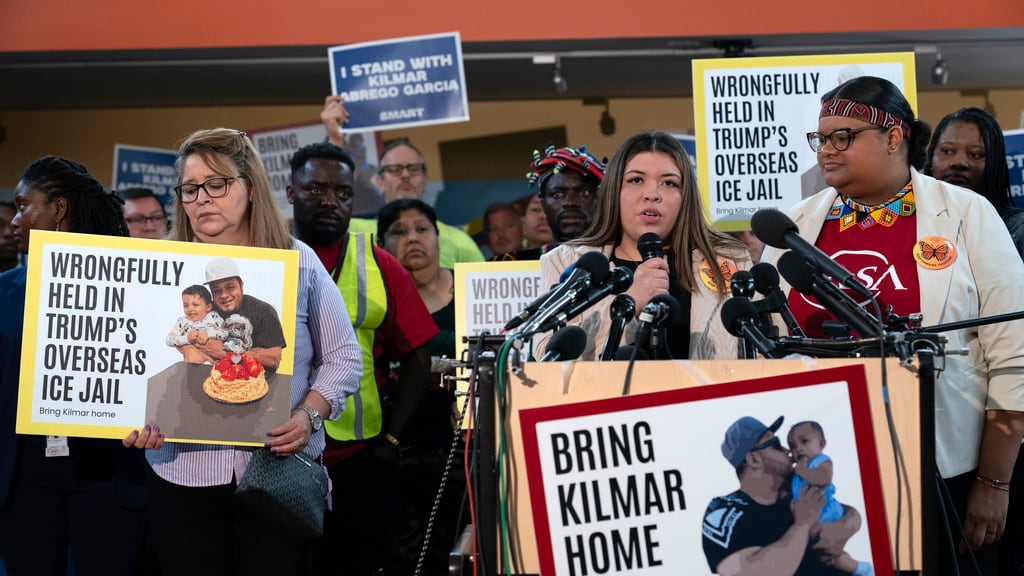WASHINGTON (AP) — The Supreme Court of the United States has determined that the government of President Donald Trump must “facilitate” the return of a man from Maryland who was mistakenly deported to a prison in El Salvador, rejecting the government’s emergency appeal.
PUBLICIDAD
The highest U.S. court intervened in the case of Kilmar Ábrego García, a Salvadoran citizen who had a court order from an immigration court preventing him from being deported to his home country out of fear of being persecuted by local gangs.
PUBLICIDAD
The federal district judge, Paula Xinis, had ordered that Ábrego García, who is currently detained in the maximum security prison built by President Nayib Bukele, be sent back to the United States before midnight on Monday. Xinis wrote that the decision to arrest Ábrego García and send him to El Salvador appears to be “completely illegal”.
What does “facilitate” the return of Ábrego García mean?
“The order as such requires the government to ‘facilitate’ Ábrego García’s release from El Salvador’s custody and ensure that his case is handled as if he had not been improperly sent to El Salvador,” the court stated in an unsigned order with no dissent noted.
The decision is announced after a series of rulings in the emergency docket of the court where the conservative majority has supported, at least partially, the Trump administration amid a wave of lower court orders slowing down the president’s agenda.
In the case of Thursday, Supreme Court Chief Justice John Roberts had already postponed the deadline set by Xinis, and the justices said that he must now clarify his order to ensure that it does not interfere with foreign policy matters of the executive branch, as Ábrego García is detained abroad.
The court said that the Trump administration should also be prepared to share the measures it has taken to try to bring Ábrego García back to the country and what else it could do.
The legal doubt lies on the word “facilitate” in the Supreme Court’s order, as it can have a broad interpretation and seems to be different from “ordering” Ábrego García’s return.
Why did the Trump government deport a Salvadoran citizen?
The government asserts that Ábrego García is a member of the MS-13 gang, although he has never been charged or convicted of a crime. His lawyers claimed that there is no evidence that he was a member of this group.
The government has admitted that it made a mistake by sending him to El Salvador, but argued that there is nothing they can do about it now.
The liberal judges of the court said that the government should have hurried to correct its “atrocious mistake” and that it was “clearly wrong” to suggest that it could not bring him back home.
Ábrego García, 29 years old, was arrested by immigration agents and deported last month.
In 2019, an immigration judge prohibited the federal government from deporting Abrego García to El Salvador, after determining that he faced probable persecution by local gangs.
He had a permit from the Department of Homeland Security to work legally in the United States and was an apprentice metalworker while seeking to obtain his license to perform various trades, his lawyer indicated. His wife is a U.S. citizen.
The Trump administration does not clarify what it has done for the return of Ábrego García
This Friday, federal judge Paula Xinis strongly criticized a lawyer from the United States government who could not explain what, if anything, the Donald Trump administration has done to organize the return of Ábrego García.
“Where is it and under whose authority?” questioned federal district judge Xinis in a Maryland courtroom.
“I am not asking for state secrets,” he pointed out. “All I know is that he is not here. The government was prohibited from sending him to El Salvador, and now I am asking a very simple question: where is he?”
Drew Ensign, an assistant deputy to the attorney general, said that the government does not have evidence to contradict the belief that Abrego García is still in El Salvador.
Xinis seemed exasperated that Ensign couldn’t tell her where Abrego García is, what the government has done to organize his return, or what else they plan to do to bring him back to the United States.
“That is extremely concerning,” stated the judge.
The judge repeatedly asked Ensign about what had been done to facilitate Abrego García’s return, directly asking: “Have you done anything?” to which the assistant deputy responded that he had no personal knowledge of what had been done. “So that means you haven’t done anything,” responded the judge.
